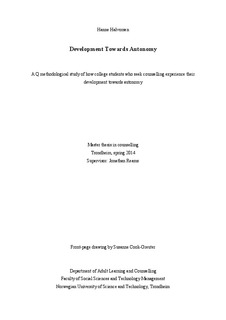| dc.contributor.advisor | Reams, Jonathan | nb_NO |
| dc.contributor.author | Halvorsen, Hanne | nb_NO |
| dc.date.accessioned | 2014-12-19T14:45:38Z | |
| dc.date.available | 2014-12-19T14:45:38Z | |
| dc.date.created | 2014-10-10 | nb_NO |
| dc.date.issued | 2014 | nb_NO |
| dc.identifier | 754411 | nb_NO |
| dc.identifier.uri | http://hdl.handle.net/11250/271882 | |
| dc.description.abstract | College serves as a venue for development, where one aim is to produce autonomous students. In this process of developing towards autonomy difficulty and challenges occurs, and thus some students choose to seek counselling. Based on this it has been desirable to gain a deeper understanding of how college students experience this process. Hence, the research question of this thesis is: How do college students who seek counselling experience their development towards autonomy?
This thesis is conducted by using Q methodology. 14 college students who have been to counselling participated in this research. Based on the research question the participants sorted 36 statements in accordance with their recognition of themselves in them, from least like me to most like me. The statements were produced with the help of Fisher’s balanced block design. The research design includes theory about self-efficacy, self-awareness in a developmental perspective, and the counselling relation.
Based on an analysis of the participants’ Q sorts, a four-factor solution appeared. The factors represent different viewpoints existing among the college students who seek counselling, related to the development towards autonomy. These were further interpreted and given names. Factor 1: Others make me feel strong, but I do not do what is required to succeed. Factor 2: All the expectations make me lack a feeling of control. Factor 3: I take responsibility for personal development, but not necessarily in school. Factor 4: Although I work hard I need others to believe in me. The factors were discussed in relation to theory. What emerged was an understanding that the factors represent different points along the journey towards autonomy. At the same time, all of the students also have a tendency to prevent themselves from full potential of development. An increased self-awareness is believed to be necessary to overcome this, which can be attained with the help of counselling. | nb_NO |
| dc.language | eng | nb_NO |
| dc.publisher | Norges teknisk-naturvitenskapelige universitet, Fakultet for samfunnsvitenskap og teknologiledelse, Institutt for voksnes læring og rådgivningsvitenskap | nb_NO |
| dc.subject | development | en_GB |
| dc.subject | autonomy | en_GB |
| dc.subject | self-efficacy | en_GB |
| dc.subject | self-awareness | en_GB |
| dc.subject | relation | en_GB |
| dc.title | Development Towards Autonomy: A Q methodological study of how college students who seek counselling experience their development towards autonomy | nb_NO |
| dc.type | Master thesis | nb_NO |
| dc.source.pagenumber | 55 | nb_NO |
| dc.contributor.department | Norges teknisk-naturvitenskapelige universitet, Fakultet for samfunnsvitenskap og teknologiledelse, Institutt for voksnes læring og rådgivningsvitenskap | nb_NO |
